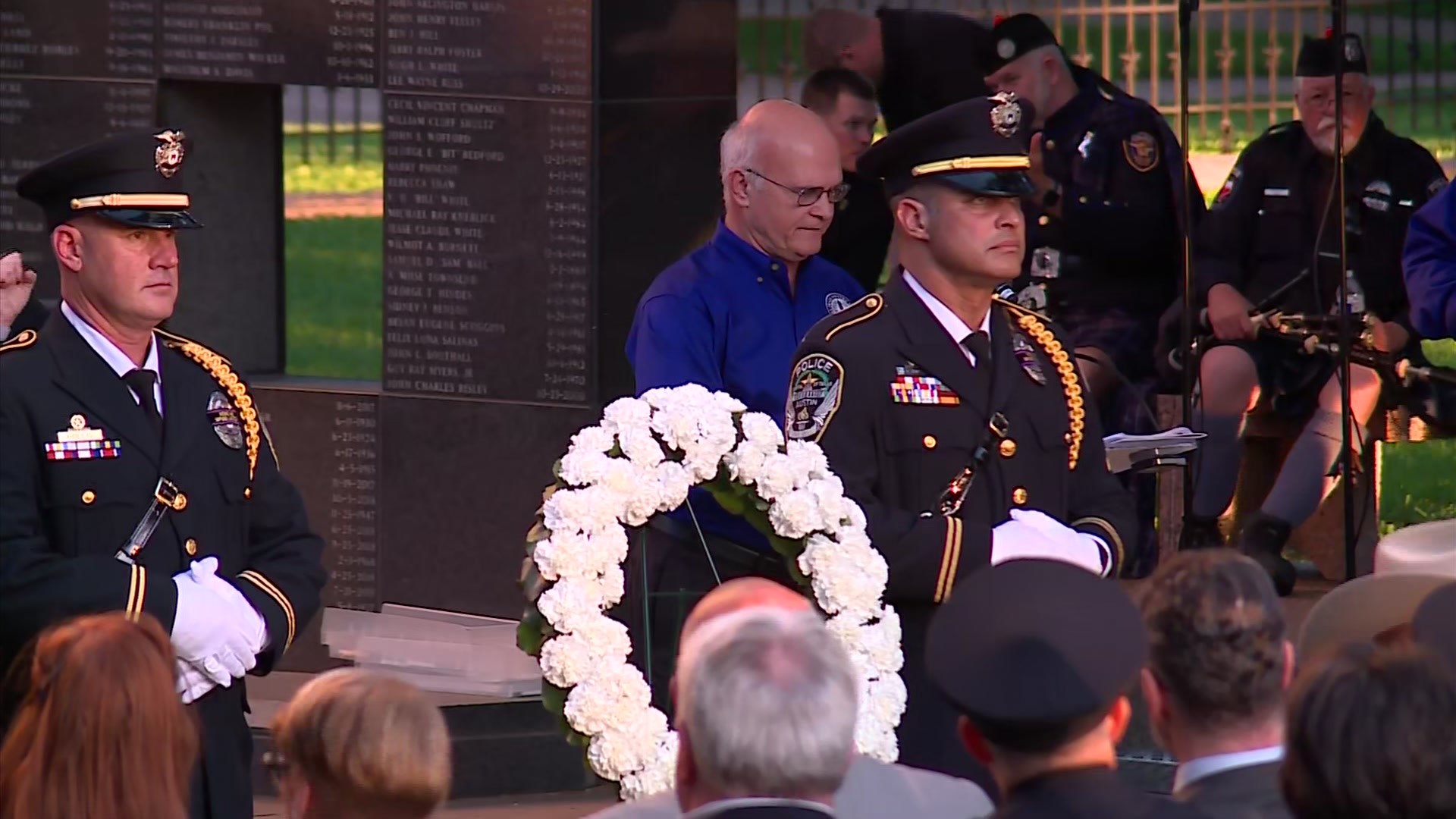NBC 5 Investigates has obtained documents raising new questions about whether current state rules are enough to keep kids from getting sick at splash pads.
It’s an issue that’s reached a new level of concern since 3-year-old Bakari Williams died after contracting a serious illness from an amoeba after visiting an Arlington splash pad in 2021.
“We just want you all to know that Bakari was a loving, energetic, passionate, sweet, beautiful, innocent boy,” said Tariq Williams, Bakari’s father, at a news conference last year after the child's death.
A simple trip to a splash pad ended the energetic boy’s life.
“He didn't deserve to die in this manner,” Tariq said.
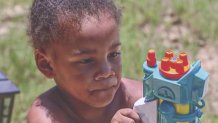
Bakari’s death brought attention to a rare brain-eating amoeba that can be found in lakes or rivers, and sometimes poorly chlorinated pool water.
Local
The latest news from around North Texas.
In Arlington, city records revealed staff was not testing the chlorine levels every day at Misenhimer Park, where Bakari played. Samples taken from the splash pad later confirmed the presence of the amoeba in the water.
“My heart just fell to the floor that I knew we did not do our job,” said Michael Debrecht, Arlington Assistant Parks Operator in an interview with NBC 5 Investigates.
The city quickly acknowledged its mistakes, settled a lawsuit with the boy’s family, and set out to do better by investing in new splash pad equipment, and establishing tougher standards for safety and water testing that they dubbed the “Bakari Williams Protocol.”
“We wanted to tell our public that we did everything in our power to make this safe for families to use. And that's what we did,” Debrecht said.
Among the changes was checking the water three times throughout the day, not just once per day, to ensure that large crowds or equipment malfunctions haven’t caused a sudden decrease in chlorine levels.
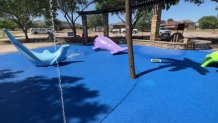
The Centers for Disease Control and Prevention (CDC) also recommend splash pads test the water at least every two to four hours when open to the public.
Texas law, however, only requires testing once per day and, as NBC 5 Investigates discovered, many cities are only following that minimum state requirement.
NBC 5 Investigates requested records and found at least six DFW-area cities with splash pads where the water is tested only once per day, often in the morning before it opens.
Kim Bybee, manager of Carrollton Parks, said they didn’t have the staff to test more frequently than once per day.
“Our splash parks are freestanding remote facilities. We don't have dedicated staff at these locations, so it's hard for us to kind of get all over the place with multiple locations,” Bybee said.
Bybee said their ultimate goal is to follow state regulations of checking the water once per day and not the CDC guidelines recommending more frequent checks every two to four hours.
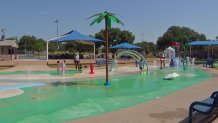
Roy Vore, a water safety expert who helped write the CDC’s splash pad guidelines, said the best practice is to monitor the water more than once a day and Texas should revise its code to adopt that tougher standard.
Vore, who also sits on the Pool & Hot Tub Alliance Water Quality Committee, said if a facility didn’t have anyone on site and was only checking the water once in the morning, he wouldn’t allow his family to visit the splash pad.
“My kids wouldn't get within a mile of that facility,” Vore said. “If I were a health inspector, I would red tag it until they had somebody onsite.”
Vore said that splash pads can sometimes be more risky than public pools because they are what he calls “bottom washers.”
“That's basically what you're doing,” Vore said. “You're washing stuff right off kids bottoms and they may not have the best sanitation practices.”
Because of that, Vore said chlorine levels can change quickly making once-a-day testing insufficient.
“That is unacceptable. That is an unacceptable practice,” Vore said. “They need to prioritize their budget and put somebody there to swing by, at least at noon and at least at 4 p.m. And If they don't have the money to run it, don't run it.”
Carrollton insisted its system is extremely safe because machines on-site constantly monitor chlorine levels and add more when needed. The city also has backup UV disinfection systems designed to kill any bacteria that the chlorine doesn’t.
“We have automatic disinfection systems that are very reliable, and they do the work throughout the day,” Bybee said.
But some experts said backup UV disinfection is not guaranteed to kill certain clusters of bacteria and they point out automated chlorination systems can malfunction, causing them to incorrectly read the chlorine levels.

“They need to be continuously calibrated and if there is shifting in there or there is a blockage in the sensor, then you have no disinfectant and now you have potential for serious illness, if not a fatality,” said Vore.
NBC 5 Investigates saw how the automated systems can fail at Grand Prairie’s Splash Factory Park. We obtained city records that showed chlorine levels have dropped below the state minimum of one part per million on at least 24 days this summer.
The city said the low levels were the result of calibration issues with its automatic system.
“We’re still working with our installer for some final adjustments to get it where we’re comfortable in an automated state,” said Duane Strawn, director of Grand Prairie Parks.
But Grand Prairie has staff on site, all day, and is constantly checking the chlorine levels by hand and they can immediately shut the splash pad down if levels drop below the minimum.
“It falls below the minimum, when we blow the whistle, we clear, we add, we test,” said Strawn.
In Arlington, they’re now keeping a higher minimum chlorine level in their splash pads. Records obtained by NBC 5 Investigates showed the levels are typically between three and five parts per million. The city said that’s to keep it from ever falling near or below the state minimum level of one part per million.
Parents visiting Arlington parks can also see the most recent chlorine test for themselves by pointing the camera on their phone at a QR code posted on a sign; scanning the code will bring up the results before their kids get in the water.

Arlington is also now sharing its “Bakari Williams Protocol” with cities across the country.
“Part of our mandate is to go tell our story,” Debrecht said.
Brian Hargrove, an attorney representing the Williams family, told NBC 5 Investigates that he hopes other cities will implement the protocol and that boy’s parents hope Texas lawmakers will listen, too.
“They need to know about this. They need to know about what happened,” Hargrove said.
Hargrove said the Williams family wants the state to bring its rules in line with the new standards that both the city of Arlington and the CDC recommend.
“You know, we can't just stop where we are at, we got to keep this going,” Hargrove said.
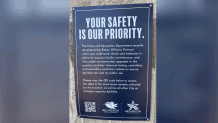
NBC 5 Investigates asked the Texas Department of State Health Services, the agency that administers splash pad safety rules, why the state has not adopted tougher standards. A Texas DSHS spokesperson responded by email with the following statement: “Our Consumer Protection Division is looking at the possibility of revising the PIWF (public interactive water feature) rules but does not yet have details on possible changes.”
Meanwhile, Vore said parents who are concerned about the chlorine level at area splash pads can buy a box of water test strips at most pool supply stores and use those to test the water at area parks before allowing their kids into the water. Vore said the tests can deliver results in about 15 seconds.
Below you can also browse records obtained by NBC 5 from cities across North Texas to see what safety systems and testing policies are in place.
Sign up for our Breaking Newsletter to get the most urgent news stories in your inbox.


